|
|
|
Sort Order |
|
|
|
Items / Page
|
|
|
|
|
|
|
| Srl | Item |
| 1 |
ID:
093581
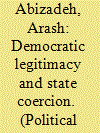

|
|
|
| 2 |
ID:
134063
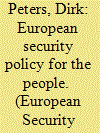

|
|
|
|
|
| Publication |
2014.
|
| Summary/Abstract |
The democratic foundations of European integration in the foreign and defence realm are increasingly being debated. This article looks at the question of democratic legitimacy from one particular angle, by examining public opinion as measured in Eurobarometer surveys between 1989 and 2009. Based on reflections about the relation between polling results and wider questions of democracy, it examines three aspects of public opinion: general support for a common foreign and a common defence policy; differences among support rates in EU member states; and what roles Europeans would prefer for European armed forces. It turns out that general support for a common foreign policy is high, whereas the desirability of a common defence policy is much more contested. Moreover, citizens across Europe would prefer European armed forces to take on traditional tasks, as territorial defence. An EU defence policy that goes beyond strict intergovernmentalism and is directed towards protecting international law and universal human rights would thus require a significant communicative effort to become accepted.
|
|
|
|
|
|
|
|
|
|
|
|
|
|
|
|
| 3 |
ID:
111579
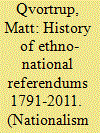

|
|
|
|
|
| Publication |
2012.
|
| Summary/Abstract |
This article presents an overview of the total number of ethno-national referendums since the French Revolution to the present day. After establishing a typology of referendums, the article goes on to present the trends in their use from the beginning of the eighteenth century to the present day. While referendums are said to be about democratic legitimacy and idealistic principles, the history suggest that short- and long-term political calculations have been the main motivations for holding them and that their overall number have grown, especially in times of geopolitical upheaval.
|
|
|
|
|
|
|
|
|
|
|
|
|
|
|
|
| 4 |
ID:
134062
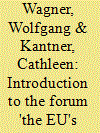

|
|
|
|
|
| Publication |
2014.
|
| Summary/Abstract |
The democratic control and legitimacy of the Common Security and Defence Policy (CSDP) has received growing attention. However, thus far, studies have mostly focused on 'blue prints', i.e., the analysis of formal powers of formal institutions, especially the European Parliament. These studies leave two desiderata that the contributions to this forum aim at overcoming: Firstly, in-depth case studies are required on how formal institutions make actual use of their formal powers in CSDP. Secondly, an examination of the 'sociocultural infrastructure' in which formal institutions and decision-making processes are embedded is required. The contributions to this forum redress both deficits. First, the actual practices of parliamentary involvement in the case of the EU's first maritime mission 'Atalanta' are examined. Second, the most important dimensions of the 'sociocultural infrastructure' are empirically studied, namely public opinion, the public sphere and civil society.
|
|
|
|
|
|
|
|
|
|
|
|
|
|
|
|
| 5 |
ID:
113345
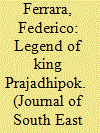

|
|
|
|
|
| Publication |
2012.
|
| Summary/Abstract |
The figure of King Prajadhipok (r. 1925-35), Siam's last absolute monarch, remains of great significance to Thailand's contemporary political discourse. King Prajadhipok's historical role as the 'founding father' of Thai democracy, in particular, lies at the heart of the Chakri dynasty's claim to democratic legitimacy - a claim that is now widely questioned, both at home and abroad. This article re-examines King Prajadhipok's conduct in the early days of constitutional government in Siam. While the King's status as the father of Thai democracy is exposed as a myth, his actual historical legacy is shown to have been no less profound.
|
|
|
|
|
|
|
|
|
|
|
|
|
|
|
|
| 6 |
ID:
111576
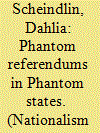

|
|
|
|
|
| Publication |
2012.
|
| Summary/Abstract |
This study examines the widespread use of referendums in entities that have declared statehood unilaterally but are not generally recognized or accepted as sovereign entities. Referendums in this situation pose a problem: to the voters, they are sufficiently a meaningful political process to warrant participation. Yet, to outsiders-including actors who may have large influence over whether the referendum's political goal can be implemented-the entire process may be meaningless. This article argues that the referendum process is not meaningless but symbolic: It fills the space between actual and desired political reality for the entities who vote. Drawing on referendum experiences in seven phantom states, the research shows that the referendums play a critical role in articulating political intentions, staking out a self-determination or sovereignty claim, displaying democratic legitimacy and forging international divisions and coalitions. Even not holding a referendum has a symbolic meaning regarding the political goals of an incomplete entity. I argue that not only can referendums signal these meanings but they can contribute to making political goals increasingly real.
|
|
|
|
|
|
|
|
|
|
|
|
|
|
|
|
| 7 |
ID:
145413
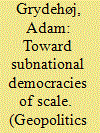

|
|
|
|
|
| Summary/Abstract |
Although democracy is often discussed as a universally applicable ideology, the liberal democratic state tends to assess democracy on the basis of government institutions. This paper argues that democratic institutionalism favours national governments and makes it difficult for subnational governments to expand their governance capacity and exercise additional powers. Greenland, Shetland, and Tresco (Isles of Scilly) serve as case studies of different subnational strategies for exercising greater governance capacity: 1) Actual adherence to democratic form (Greenland), 2) Symbolic adherence to democratic form (Shetland), and 3) Operating external to democratic form (Tresco). Despite the efforts of local governance actors, governance in these three island communities has proved problematic in terms of democratic legitimacy, legality, and/or effectiveness. It is argued that pressure toward the development of liberal democratic government institutions can in fact decrease the quality of subnational democracy. This requires a reassessment of definitions of democracy and authoritarianism. It is necessary to pursue place-specific and community-sensitive democracies of scale if we wish to democratically empower local communities.
|
|
|
|
|
|
|
|
|
|
|
|
|
|
|
|
| 8 |
ID:
184257


|
|
|
|
|
| Summary/Abstract |
We examine the democratic legitimacy of popular referendums asking whether they should be understood as bypassing or complementing representative institutions. To answer this question, we focus on the distinction between legislative referendums and consultative ones, noting that even though referendums of the latter kind are by far more prevalent from an empirical point of view, their specific role in democratic decision-making remains under-theorized in the existing literature. We therefore focus on consultative referendums as a possible way of reconciling the referendum procedure with representative democracy. First, we clarify the specific conception of representative democracy that underscores our study; second, we develop the idea that consultative referendums are to be understood to specify the political mandate of elected representatives; finally, we apply the results of this conceptual work to the case of the Greek bailout and the Brexit referendums, aiming to dispel some lingering misconceptions concerning the normative implications of their results and thereby clarifying the normative significance of our theory.
|
|
|
|
|
|
|
|
|
|
|
|
|
|
|
|
| 9 |
ID:
178858
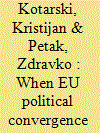

|
|
|
|
|
| Summary/Abstract |
The unifying theme of our study is that democratic backsliding in the post-socialist new EU member states occurs against the backdrop of existing or emerging cases of state capture. Following an extensive overview of corporate and party state capture, we update and develop new empirical indicators for tracing each phenomenon. Our claim is that while both varieties of capture have negative effects on democratic legitimacy, there are striking differences in their modus operandi. In that regard we provide two critical case studies, Croatia and the Czech Republic.
|
|
|
|
|
|
|
|
|
|
|
|
|
|
|
|
| 10 |
ID:
129580
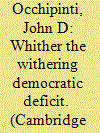

|
|
|
|
|
| Publication |
2014.
|
| Summary/Abstract |
This article examines how the Lisbon Treaty's changes to the European Union's (EU's) Area of Freedom, Security and Justice (AFSJ) have affected its 'democratic deficit'. How this issue is perceived depends on one's conceptual understanding of democratic legitimacy. This article reviews key scholarly perspectives on this matter and organizes these according to Schmidt's concepts of 'inputs', 'throughputs' and 'outputs'. The article then applies this framework to specific innovations of the Lisbon Treaty, including new roles for the European Parliament and Court of Justice in the AFSJ. The article concludes that the EU's latest treaty has improved its democratic deficit in some regards, but that many issues of democratic legitimacy remain.
|
|
|
|
|
|
|
|
|
|
|
|
|
|
|
|
|
|
|
|
|